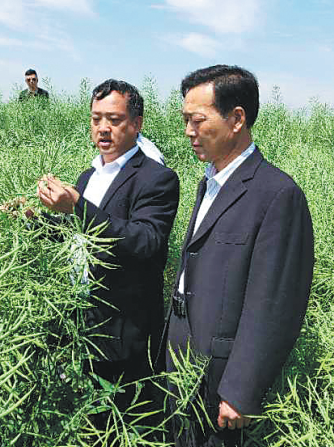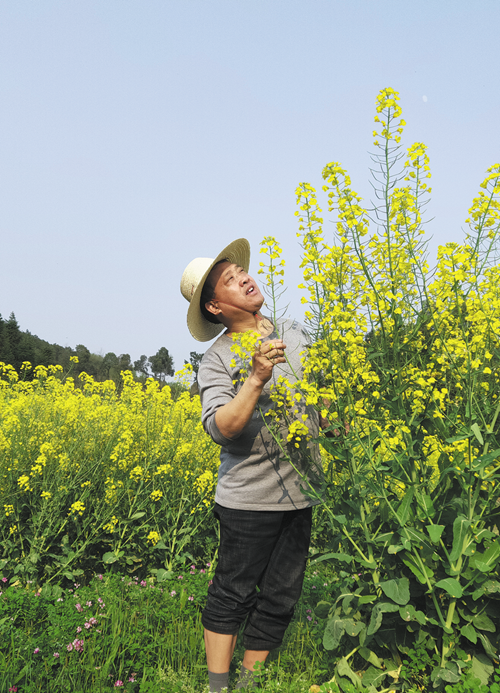FIELD of DREAMS

Son carries on his father's legacy to develop "super" breed of hybrid rapeseed that delivers greater economic benefits to farmers.
Villagers used to call Shen Changjian and his late father Shen Kequan day dreamers when they would talk about developing high-yield hybrid rapeseed.
Farmers in Linli county of Hunan province's Changde city, between them, the pair spent more than 40 years experimenting with rapeseed hybrids in the belief that it would bring great social and economic benefit.
In 1978, in Guizhou province, Shen Kequan found three wild canola plants, each of which had a long flowering period. He brought them back to his hometown for cross-fertilization at his beekeeping farm.
At first, villagers laughed at his attempts to play scientist without the education-having only graduated from middle school-to back up his ambition. Determined, he knew the only way to prove them wrong was to produce high-yield rapeseed varieties and swore that he would grow his beard until he was successful.
"In order to do research, my father started to ask people to help him buy books on breeding technology," Shen Changjian says. "He worked in the field during the day and read books until midnight."
He conducted thousands of experiments and compiled 23 notebooks worth of notes on them, Shen adds.
Back then, Shen Changjian worked as a driver earning more than 200 yuan ($30.66) every day. After spending all the family savings on the research and owing thousands of yuan to relatives and friends, Shen Kequan turned to his son, persuading him to sell his minibus and use the proceeds to help with the rapeseed experiment.
In 2004, one of the rapeseed varieties produced by the duo received a national invention patent. Three years later, they took their canola plant, which was about 2 meters tall and had more than 100 branches, to the 12th international rapeseed congress held in Wuhan, Hubei province.
Plant height and branch number are essential components of rapeseed plant architecture and are directly correlated with its yield.
"Although we were not officially invited to the congress, the plant we took there won praise from domestic and international experts and our 'super rapeseed' became famous," Shen Changjian says.
In 2009, Shen Kequan passed away and the family buried him on the hillside not far from his field of experimental crops.
"We buried him there so that he could protect the rapeseed. His final wish was for me to continue his work," Shen Changjian explains.
However, the family was in debt to the tune of 280,000 yuan as a result of the pair's research. "The debt seemed insurmountable to a farmer like me," Shen recalls, "I really wanted to give up, but I persevered."
Shen Changjian took up the baton and, while he took on the hard labor in the field by himself, he sought help from specialists as he started his own research.
In June last year, one of his varieties, the Shen hybrid rapeseed No 1, which has double the yield of ordinary crops, was registered at the Ministry of Agriculture and Rural Affairs-making Shen Changjian the first farmer in China to win national recognition for developing a new rapeseed variety.
In the past, villagers were reluctant to grow rapeseed due to its limited yield and economic benefits, but Shen has started to help them cultivate his high-yield variety.
As it can significantly increase production, villagers have flocked to him for the seed and the breeding technology, which he has provided for free.
Shen now has a rapeseed breeding base of 2,000 mu (133 hectares), which, at its busiest, employs more than 1,000 villagers.
He was elected as a deputy to the National People's Congress in 2018 and often visits farmers to check on their rapeseed crops and consult with them.
Xu Shuling is one of the villagers that received help from Shen. Her husband cannot undertake manual labor due to illness, so she has to support the family through farm work.
Since 2016, Shen has let Xu grow rapeseed on 100 mu (1.67 hectares) of his land and taught her the breeding technology.
"With his help, I can make more than 100,000 yuan every year, which was almost unimaginable in the past," Xu says.
Contact the writers at zoushuo@chinadaily.com.cn
























